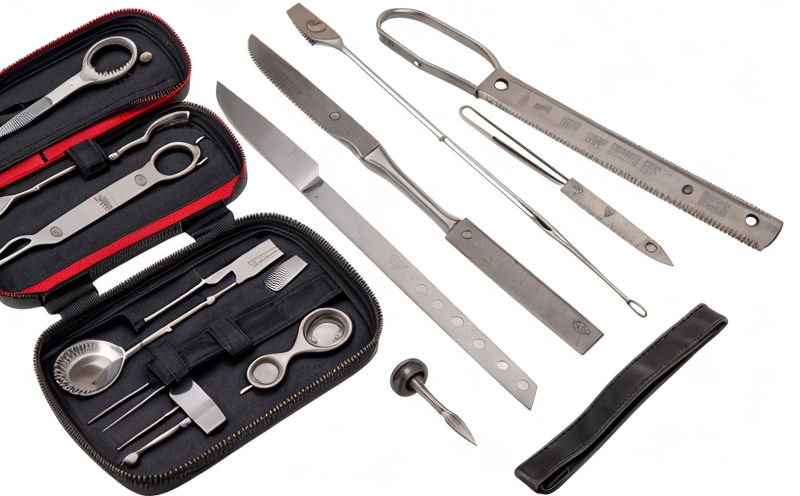Residual Endotoxin Testing on Reprocessed Instruments
In today’s healthcare environment, ensuring the safety and efficacy of surgical instruments is paramount. Residual endotoxin testing plays a critical role in this regard, especially for reprocessed surgical instruments used multiple times within healthcare settings.
Endotoxins are potent pyrogens derived from gram-negative bacteria. Their presence can trigger undesirable immune responses such as fever, septic shock, and other inflammatory conditions. The removal of endotoxins is essential to prevent these adverse reactions in patients during surgeries.
EuroLab’s expertise lies in providing comprehensive testing services that ensure the safety of reprocessed surgical instruments. Our Residual Endotoxin Testing service ensures that any gram-negative bacteria or their remnants are adequately removed through reprocessing procedures, thereby safeguarding patient health and compliance with regulatory standards.
Our testing process begins with a thorough assessment of the instrument’s design and materials to determine the appropriate reprocessing method. This includes steam sterilization, ethylene oxide gas, hydrogen peroxide vapor, or other validated techniques. The selected method must effectively destroy any viable bacteria while minimizing damage to the instrument.
Post-reprocessing, we take a sample from the instrument using aseptic techniques and process it for endotoxin testing according to ISO 11137-1:2016, which specifies a standardized procedure for determining the presence of endotoxins. The extracted sample undergoes a series of steps including dilution, filtration, and reaction with Limulus Amebocyte Lysate (LAL) reagent.
The LAL test is particularly sensitive to lipopolysaccharides, which are the main components of endotoxins. The assay measures any residual levels of these compounds that might not have been fully removed during reprocessing. If the result exceeds the acceptable threshold (typically 0.5 EU/mL), it indicates inadequate sterilization.
This testing ensures compliance with ISO standards and regulatory requirements such as those outlined in the Medical Device Directive (MDD) or its successor, the Medical Devices Regulation (MDR). By adhering to these stringent guidelines, we help medical device manufacturers and healthcare facilities meet their obligations under international legislation.
Our laboratory uses state-of-the-art equipment including a LAL detector which provides accurate and reliable results. The entire process is meticulously documented, ensuring traceability and compliance with Good Laboratory Practices (GLP).
The importance of this testing cannot be overstated, particularly in environments where reprocessed instruments are reused multiple times. Ensuring the absence of residual endotoxins not only enhances patient safety but also protects healthcare providers from potential legal liabilities.
Moreover, our service offers valuable insights into the effectiveness of current sterilization protocols and provides feedback to manufacturers for continuous improvement in their reprocessing methods. This proactive approach helps prevent any lapses that could compromise patient care or compliance with regulatory standards.
EuroLab Advantages
At EuroLab, our commitment to excellence is reflected in the precision and reliability of our Residual Endotoxin Testing service. Our advantages are manifold:
- Accurate Results: Leveraging cutting-edge technology and methodologies, we deliver highly accurate test results.
- Comprehensive Expertise: Our team of experts ensures that every aspect of the testing process adheres to international standards.
- Regulatory Compliance: We help our clients meet stringent regulatory requirements with our thorough and compliant services.
- Fast Turnaround Time: We understand the urgency in medical device development, hence providing rapid yet precise testing results.
Why Choose This Test
The decision to perform residual endotoxin testing on reprocessed surgical instruments is crucial for several reasons:
Enhanced Patient Safety: By ensuring that no harmful endotoxins remain, we minimize the risk of adverse reactions in patients.
Legal Compliance: Adhering to international standards and regulations ensures that our clients are compliant with legal requirements.
Risk Mitigation: Our testing helps identify any potential risks associated with reprocessing methods, thus minimizing liability issues for healthcare providers.
Quality Assurance: The results of these tests serve as a benchmark for quality control and improvement in the sterilization process.
Competitive Advantage and Market Impact
EuroLab’s Residual Endotoxin Testing service provides significant competitive advantages:
- Enhanced Reputation: By consistently delivering reliable test results, our clients can build a strong reputation for quality.
- Customer Satisfaction: Meeting regulatory and safety standards ensures high levels of customer satisfaction.
- Innovation Support: Our testing service supports continuous improvement in reprocessing methods, driving innovation within the industry.
- Market Leadership: By providing comprehensive and reliable services, we help our clients stay ahead of competitors.





